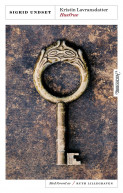
Among her other celebrated works are the novels The Master of Hestviken and Ida Elizabeth, and a powerful spiritual biography of the great saint, Catherine of Siena.įr.

In a world so pockmarked by suffering, disappointment, and cruelty, Jesus Christ alone gives meaning to the word "love". This spiritual turn-which already began during the writing of Kristin Lavransdatter-shaped the very heart of her work, as well as her own life as a mother.

In 1924, she converted to Roman Catholicism, scandalizing Protestants and atheist intellectuals alike, and leaving her isolated.

Her painterly eye for the Scandinavian countryside, her uncompromising emotional realism, her concrete sense of history, her bold vision of woman and man-these won her such acclaim that she received the 1928 Nobel Prize for Literature, not long after the publication of her historical epic novel, Kristin Lavransdatter.ĭuring World War II, she loudly opposed anti-Semitism and the Nazi regime, and in the final years of her life, the Norwegian state awarded her the Grand Cross of the Order of Saint Olav-the first time this honor was given to a woman outside the royal family.īut something more than courage and literary brilliance set Undset apart. Novelist Sigrid Undset (1882–1949) left a transformative mark on twentieth-century literature, not only in her homeland of Norway, but across the West.


 0 kommentar(er)
0 kommentar(er)
